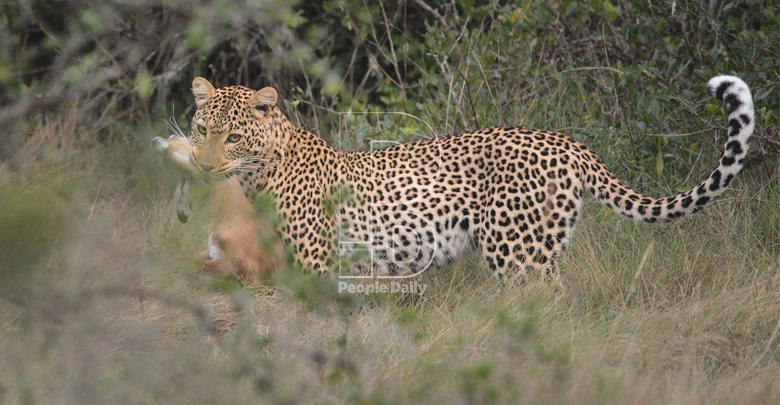Wild about wildlife photography
By Njeri Maina, July 7, 2021A picture is worth a thousand words… Seyan and Khushi Hirani are intent on taking great shots that highlight wildlife behaviour with the aim of creating goodwill about the animals among Kenyans. Njeri Maina caught up with the cousins, frequent park photographers, to learn about their journey and their bond.
Njeri Maina @njerimainar
While many people cannot tell the cheetah and the leopard apart, Seyan and Khushil Hirani not only can tell them apart, but have also taken numerous photographs of the latter.
This is no mean feat as leopards are hard to spot. After coming across their stunning photos on social media and learning that they are first cousins, I decide to do an interview on them, their love for wildlife and their plans for the future.
The duo not only share their love for photography, but they also love cats with Khushi being, especially enamoured with lions, which he finds regal, and Seyan loving the strength and grace evinced by leopards. But what drew them to photography to start with?
“I have always loved nature drives. I would go for weekend drives with my family and enjoy nature.
I would get my first camera from a friend and take photos of wildlife during the nature drives on weekends when I was away from school.
Covid-19 allowed me to explore this further as there was more time to spend looking for animals and getting better at photography,” 14-year-old Seyan says.
Shared dreams, equipment
Khushil shares how after some time he started joining Seyan on drives and would be invariably drawn into the photography world. With the borrowed camera, they started taking photos together.
They soon bought a big camera and a single big lens and another small lens. This meant that the young photographers could now each have a camera, but would have to share the lenses.
While one would think this would cause conflict, it just managed to draw them closer as they found a way to share the lenses on a rotating basis.
“Photography equipment is expensive, especially when starting out. So we just learnt to share what we had.
We are also invested in each other’s success, so there is no conflict about who uses what lens when,” says 20-year-old Khushil.
Khushil says how photography has drawn them closer, as they stay for long hours on end in the park waiting to see if they will spot any wildlife.
One can stay for hours before coming across any wildlife on some days, while on others, one can spot various animals within minutes of each other.
Seyan chips in saying that he learnt of Khushil’s impeccable sense of humour during some of the long waits on the game drives.
One can clearly see their brotherly bond from how they speak about their shared experiences, adding tid bits of information to each other’s story.
It is clear that they like working together and challenge each other to be better.
They tell each other when opportunities for upskilling are available and teach other new skills such as editing or the use of better light in order to take better photographs.
They are committed to doing wildlife photography as a way of contributing to the dialogue around animals, with both balancing schoolwork with photography.
Seyan who is in Year Eight at St Mary’s School would like to be a conservationist or an architect, preferably both.
Khushil is pursuing a degree in environmental engineering even as he immortalises cats in stills. One cannot help, but wonder what the highlights of their photography journey are.
The highlights
Catching a leopard hunt an impala at Nairobi National Park is Khushil’s highlight.
He explains just how hard it is to spot that as leopards love hunting at night.
He shares that there is a great amount of work that goes into spotting them as they are quiet animals who love lazing high up on trees during the day.
One has to, therefore try and look for them using paw prints—they have a bigger paw print with no claw marks as they have retractable claws unlike cheetahs.
For Seyan, it was the naming of two leopard cubs birthed by a leopardess named Koko. He named them Maridadi and Kichaka.
“There is a leopardess named Koko in Nairobi National Park. She got two cubs, a son and a daughter.
We were lucky enough to spot her and her cubs on several drives. I had a compilation of several great shots of the two young cubs, and was elated when the Friends of Nairobi National Park (FONNAP) suggested that I name them.
I jumped on it, consulted a bit with family and friends and gave them authentic Kenyan names. It has to be my proudest moment,” Seyan shares.
Seyan and Khushil are happy with their photography journey and plan to keep growing from strength to strength.
They recently attended an editing workshop that showed them the gaps they had while editing their work.
They are also cognizant of the fact that there are other photographers who have helped them on their journey and made it possible to grow and fast too.
They talk about Gurcharan, a renowned Kenyan photographer, whom they say is always ready to assist with not just pointers to help with better photographs, but also on the best spots to spot wildlife in Nairobi National Park.
His work ethic and great photographs inspire the young duo to keep working and do better.
As to what they would advise buddizng photographers, they both agree that the first step is to just start.
“Start as you are with the equipment you have. Keep taking photographs and learning. It is hard to learn if you are not willing to start and put yourself out there,” Khushil sagely concludes.
